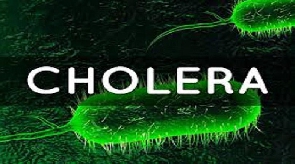 The death toll in the region has risen from eight to 15
The death toll in the region has risen from eight to 15
The Western Regional Health Directorate has begun a cholera vaccination of residents in the Sekondi-Takoradi, Effia-Kwesimintsim, Shama and Ahanta West areas, to curb the spread of cholera which has overwhelmed health facilities and affected communities.
The death toll has risen from eight to 15 as of last Thursday.
The vaccination exercise expected to end on Thursday, will cover homes, schools, churches, mosques, markets, offices, and health facilities within the communities.
In a situation report (SITREP), the directorate recorded 157 new reported cases with 1,347 cumulative cases while the total number of districts involved stood at eight.
Health workers infected are 13, according to the SITREP.
“Districts with sharp increase in number of cases stand at four including Sekondi -Takoradi, Effia-Kwesimitsim, Shama and Ahanta West. Severe cases recorded are 60, moderate, 80 and mild 65,” the Regional Director of Health Services, Dr Yaw Ofori Yeboah, briefed The Ghanaian Times.
He attributed the cholera cases to unsanitary sites for food preparation and sales by food vendors, which he described as a major factor, indiscriminate refuse dumping, poor waste management and open defecation.
Dr. Yeboah indicated that the Rapid Response Team (RRT) in partnership with the Metropolitan Municipal and District Assemblies (MMDAs) and key partner agencies would implement targeted interventions aimed at controlling and managing cholera outbreaks across all districts in the Western Region.
Further steps, he told The Ghanaian Times, include the enforcement of bylaws, continued disinfection of communities, and education of food vendors in Sekondi-Takoradi, Effia and Kwesimintsim.
He added “There‘s an exponential surge in cases in health facilities both private and public and they are supporting case management as incidence continue to surge. Van announcements have also been intensified in two hot spot districts – Sekondi and Effia-Kwesimintsim and also door-to-door sensitisation. Distribution of Intravenous (IV) fluids and antibiotics to designated facilities also continues.”
On key steps, Dr Yeboah said the Regional Health Directorate would revisit the need for stronger collaboration with MMDAs at the two hot spots, operationalise additional treatment centres, identify case management and collaborate with water companies to assess water safety.
He mentioned the low involvement of MMDAs in the outbreak response activities and unsanitary conditions in Sekondi-Takoradi and Effia-Kwesimintsim as critical challenges.
The health expert stated that people could be infected by drinking water contaminated with faeces from someone infected and also eating foods that had been washed and prepared with contaminated water.
“Anyone with cholera must be assessed at the health facility to receive prompt treatment. Early detection of cholera will save you and your family,” Dr Yeboah advised.
The health director reassured residents that cholera treatment is free in both government and private hospitals.
He maintained that “Residents should remain vigilant, practice good hygiene, and adhere to all health directives. This cholera outbreak serves as a wake-up call for collective efforts to improve sanitation and public health across the Western Region.”
Watch some videos from the recent Parliamentary sittings below: